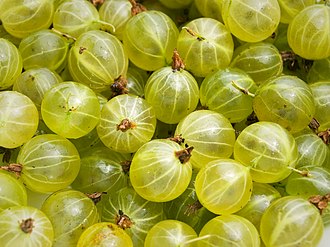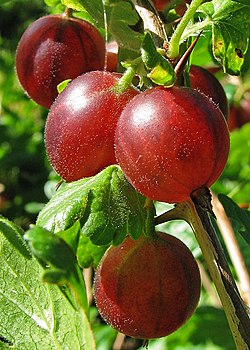Gooseberry
Introduction
Gooseberry is a fruit that belongs to the Ribes genus and is native to Europe, North America, and Asia. It is a small, round or oval fruit that can be eaten raw or used in various culinary preparations. Gooseberries are known for their tart flavor and are often used in jams, jellies, pies, and other desserts. In this article, we will explore the history, cultivation, and culinary uses of gooseberries.
History
The cultivation of gooseberries can be traced back to ancient Rome and Greece, where they were grown for their medicinal properties. In medieval Europe, gooseberries were a popular fruit and were often grown in monastery gardens. During the 16th century, gooseberries were introduced to England and became a favorite fruit of the wealthy.
Cultivation
Gooseberries are typically grown as small bushes that reach a height of 3 to 5 feet. They prefer cooler climates and are often found growing in northern regions. The fruit is ready for harvest in late spring or early summer and can be either green or red in color.
Gooseberries are easy to grow and require minimal care. They can be propagated by cuttings or by layering. The bushes should be planted in well-draining soil and should be watered regularly. They can also benefit from a layer of mulch to retain moisture in the soil.
Culinary Uses
Gooseberries are a versatile fruit that can be used in a variety of culinary applications. They are commonly used in jams, jellies, and pies, and can also be used to make sauces and syrups. In addition, they can be used to flavor ice cream, yogurt, and other desserts.
Gooseberries are known for their tart flavor, which can be balanced with the addition of sugar or honey. They can also be paired with other fruits, such as strawberries, raspberries, or blueberries, to create a delicious fruit salad.
Health Benefits
Gooseberries are a good source of vitamin C, fiber, and antioxidants. They are also low in calories and can help regulate blood sugar levels. The high levels of vitamin C in gooseberries can also help boost the immune system and protect against infections.
Varieties
There are several varieties of gooseberries, each with its unique characteristics. Some of the most popular varieties include:
Invicta: This variety produces large, green fruit that is excellent for cooking and jam making. Hinnomaki Red: This variety produces medium-sized, red fruit that is excellent for eating fresh or making jam. Pax: This variety produces small, yellow-green fruit that is excellent for eating fresh or making jam. Whinham's Industry: This variety produces large, red fruit that is excellent for cooking and jam making.
Culinary Preparations
Gooseberries can be used in a variety of culinary preparations, both sweet and savory. Here are some popular ways to use gooseberries in the kitchen:
Jams and jellies: Gooseberries are often used to make jams and jellies because of their tart flavor and high pectin content. Pies and tarts: Gooseberries can be used to make delicious pies and tarts. The tart flavor of the fruit is balanced with sugar to create a sweet and tangy filling. Sauces and syrups: Gooseberries can be cooked down into a sauce or syrup that can be used to flavor a variety of dishes, from savory meats to sweet desserts. Ice cream and yogurt: Gooseberries can be used to flavor ice cream and yogurt, adding a tart and tangy flavor to these creamy treats. Pickles and chutneys: Gooseberries can be pickled or used in chutneys, adding a tangy flavor to these savory condiments.
Conclusion
Gooseberries are a versatile fruit that can be used in a variety of culinary applications. From sweet pies and tarts to savory sauces and chutneys, gooseberries are a delicious addition to any dish. With their tart flavor and health benefits, it's no wonder that gooseberries have been a favorite fruit for centuries.
Images
Conclusion
In conclusion, gooseberries are a delicious and nutritious fruit that has a long history of cultivation and culinary use. They are easy to grow and can be used in a variety of sweet and savory dishes. So why not try adding some gooseberries to your next recipe and discover the tart and tangy flavor of this versatile fruit.
References
Classification
Kingdom Plantae - Plants
Subkingdom Tracheobionta - Vascular plants
Superdivision Spermatophyta - Seed plants
Division Magnoliophyta - Flowering plants
Class Magnoliopsida - Dicotyledons
Subclass Rosidae
Order Rosales
Family Grossulariaceae - Currant family
Species Ribes pinetorum Greene - orange gooseberryP
Categories
Nutritional information on Gooseberry
|
|
| Food Portal | Food | Nutrition | Diet | Keto | Glycemic index |
NB:Carbohydrate, by difference(total carbs-fiber) is also called net carbs
Transform your life with W8MD's budget GLP-1 injections from $125.
W8MD offers a medical weight loss program to lose weight in Philadelphia. Our physician-supervised medical weight loss provides:
- Most insurances accepted or discounted self-pay rates. We will obtain insurance prior authorizations if needed.
- Generic GLP1 weight loss injections from $125 for the starting dose.
- Also offer prescription weight loss medications including Phentermine, Qsymia, Diethylpropion, Contrave etc.
NYC weight loss doctor appointments
Start your NYC weight loss journey today at our NYC medical weight loss and Philadelphia medical weight loss clinics.
- Call 718-946-5500 to lose weight in NYC or for medical weight loss in Philadelphia 215-676-2334.
- Tags:NYC medical weight loss, Philadelphia lose weight Zepbound NYC, Budget GLP1 weight loss injections, Wegovy Philadelphia, Wegovy NYC, Philadelphia medical weight loss, Brookly weight loss and Wegovy NYC
|
WikiMD's Wellness Encyclopedia |
| Let Food Be Thy Medicine Medicine Thy Food - Hippocrates |
Medical Disclaimer: WikiMD is not a substitute for professional medical advice. The information on WikiMD is provided as an information resource only, may be incorrect, outdated or misleading, and is not to be used or relied on for any diagnostic or treatment purposes. Please consult your health care provider before making any healthcare decisions or for guidance about a specific medical condition. WikiMD expressly disclaims responsibility, and shall have no liability, for any damages, loss, injury, or liability whatsoever suffered as a result of your reliance on the information contained in this site. By visiting this site you agree to the foregoing terms and conditions, which may from time to time be changed or supplemented by WikiMD. If you do not agree to the foregoing terms and conditions, you should not enter or use this site. See full disclaimer.
Credits:Most images are courtesy of Wikimedia commons, and templates, categories Wikipedia, licensed under CC BY SA or similar.
Translate this page: - East Asian
中文,
日本,
한국어,
South Asian
हिन्दी,
தமிழ்,
తెలుగు,
Urdu,
ಕನ್ನಡ,
Southeast Asian
Indonesian,
Vietnamese,
Thai,
မြန်မာဘာသာ,
বাংলা
European
español,
Deutsch,
français,
Greek,
português do Brasil,
polski,
română,
русский,
Nederlands,
norsk,
svenska,
suomi,
Italian
Middle Eastern & African
عربى,
Turkish,
Persian,
Hebrew,
Afrikaans,
isiZulu,
Kiswahili,
Other
Bulgarian,
Hungarian,
Czech,
Swedish,
മലയാളം,
मराठी,
ਪੰਜਾਬੀ,
ગુજરાતી,
Portuguese,
Ukrainian
Contributors: Kondreddy Naveen





